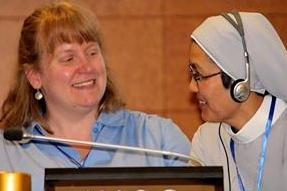What Excites Me about the Present and Future of Religious Life
In May, I had the incredible honor of representing the voices of younger women religious of North America at the triennial meeting of the International Union of Superiors General (UISG) in Rome. The UISG invited women religious from each continent to be part of a panel discussing “What excites me about the present and future of apostolic religious life?” I was both humbled and incredibly excited to speak as a younger sister to the assembled 860 superiors general from around the world.
At round tables divided by language for conversations, the participants represented all types of apostolic religious orders from around the world. Simultaneous translation brought the presentations into at least eleven languages. Liturgies and prayers often contained even more languages, including Swahili and Arabic. About half of the sisters wore habits. There was a very clear sense that we are all sisters together, despite all our differences.
The meeting began on Monday afternoon and ended with an evening mass on Friday with Cardinal João Braz de Aviz, the prefect of the Vatican´s Congregation for Institutes of Consecrated Life and Societies of Apostolic Life. Everyday there were major addresses, smaller presentations or panels, and table conversations, along with prayer, meals, and mass. The theme, “Weaving Global Solidarity for Life,” was illustrated by a piece of cloth and colored thread on each table, to be woven together throughout the week. Each day focused on solidarity in a particular way — with the earth, with those on the peripheries, and with one another throughout the world.
A theme throughout the week was that of collaboration with one another. UISG represents over 2000 congregations of active women religious around the world. With the goal of collaboration, UISG has several intercongregational projects in motion. These include teacher training in South Sudan, Talitha Koum, which works against human trafficking, and most recently, a group of sisters has landed in Sicily to assist the floods of migrants arriving there. I can´t help but think of our own desires in Giving Voice coming to fruition as we work together on different projects.
A second theme that was striking to me came from the speaker on the third day, Marian Ambrosio, IDP. She spoke of our identity as women religious coming from our how rather than what we do or why we do it. What we do is often done by laity. Why we do our ministry comes from Jesus´ call to all Christians. But we as women religious act in a unique way, always out of love, supported in our ministries and life by the daily prayer and meditation, with God as the source of our strength. In reflecting on this, I thought about how this gives us our identity in a way
that our institutions cannot, and that it gives meaning to those whose ministry is focused on prayer. It also gives meaning to the things we do that are not technically ´ministry´, such as the witness of communal living or the incidental encounters we experience on a daily basis. Sharing the love and joy we have from God has no boundaries.
Finally, the most anticipated moment of the week came for me when the entire assembly had an audience with Pope Francis. He was warmly greeted by the president of UISG, Carmen Sammut, MSOLA. She is a powerful leader, and it was at her insistence that the group was allowed to submit questions for the pope to answer. As he began, he asked that the questions (which he had about a month ahead of time) be read aloud one by one. The transcript for the entire audience can be found online. There are two areas he spoke to that particularly encouraged me.
First, as all have heard, there was some discussion about exploring the possibility of women in the diaconate or of deaconnesses. What I found more striking was how forcefully he expressed his desire to include women´s voices in decision-making in the church. This was mentioned both in regard to decisions about women religious and more generally. In fact he seemed surprised to find out that the commission on religious life does not necessarily include women religious in their discussions and decisions. So was I.
A second area where I felt encouraged by Pope Francis´s words was in a discussion about poverty. He said we each must follow our own charism and that poverty is not understood by all in the same way. This is not a concern, as long as each one follows her own congregation´s tradition. I heard in this a broader statement about the value of diversity among congregations.
On the whole, I left Rome with a greater hope for the future of religious life and a deeper sense of my belonging within it. I cannot thank Giving Voice and the UISG enough for the invitation to participate.


